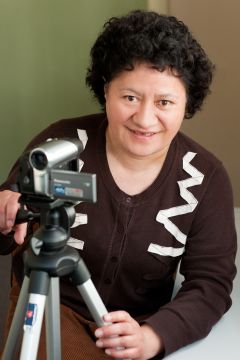Ngā mihi mahana ki a koutou.
Despite being advised on numerous occasions not to do research on either children or animals, Tia has done both. “Thankfully I managed to come out unscathed.”
Her love for working with children came later when she entered the profession of teaching, and furthered this passion by completing an Honours project in Psychology that focused on young Māori children and their delay of gratification behaviours.
Her love of animal behaviour began when she became the proud owner of a cat as a young child. She later followed-up this interest in completing a Master's Degree in Psychology, conducting behavioural and experimental work with animals' self-control behaviours.
“Having a developmental and experimental background in Psychology has enabled me to appreciate the many benefits that Psychology has to offer when identifying the strengths and needs of humans and animals.”
A PhD candidate of four years, her research project enabled her to chart a journey where she was fortunate to work alongside 60 whānau Māori (Māori nuclear and extended families).
Her research identified how whānau talk with their children about experiences that are in line with who they are, where they come from and what are important whānau and cultural practices. Next they assessed the children to see whether or not these experiences transfer to their self-control skills, language, emergent literacy and numeracy outcomes prior to entering school.
“This longitudinal study is the first of its kind and although the findings are preliminary there will be exciting results to report on whānau resilience, learning and positive change in time to come” she enthused.
Tia is grateful to whānau, Te Roopu o Pukenga, Professor Elaine Reese, Dr Tamar Murachver, Associate Professor Poia Rewi, Professor David Bilkey, Post Graduate Services, the PhD Office team and Professor Mike Colombo for their exceptional support. Because of this and the generous financial support from the Foundation of Research Science and Technology, Ngā Pae o te Māramatanga, Te Runanga o Ngā Puhi, Fulbright New Zealand, Ministry of Education, Universities New Zealand and the University of Otago this research can soon be presented to domestic and international audiences.
“To allow one to move towards completing a doctoral degree rests on a lot of sheer grit, iron clad strength and self-willed determination. Making time to have other interests such as exercise, eating healthy food, and having a cat who sits on my laptop keyboard to take my attention away from the PhD also helps to keep one's sanity intact!”
Tia Neha was named a 2012 – 2013 recipient of the New Zealand Psychological Society's Karahipi Tumuaki, President's Scholarship. This award recognises Māori centred research that ensures a procedure or movement of benefit to the Māori community and beyond.
This award recognises Māori centred research that ensures a procedure or movement of benefit to the Māori community and beyond. This comprehensive project steeped in whānau cultural capital, autobiographical memory and Māori children's school readiness has far reaching consequences in whānau collaboration and ethics, educational policy, Māori psychological tikanga, practises and assessment. This research provides other implications for further longitudinal work with the whānau and their children who are now at school. Kia Ora Koutou.
Read the NZPsS publication in the Psychology Aotearoa student forum here

Tia Neha
Department of Psychology